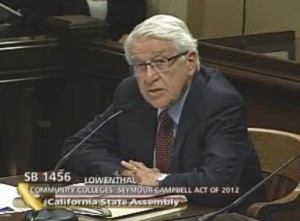Retiring Community College Chancellor Jack Scott watched his signature initiative move closer to becoming law. The Assembly Higher Education Committee yesterday unanimously passed SB 1456, the Student Success Act of 2012.
The bill would implement two of the 22 recommendations developed by the Student Success Task Force, a panel of educators, policymakers, students, and researchers that spent last year studying and taking testimony on ways to improve the completion rate at California’s community colleges.
“SB 1456 is about community college students and the tremendous fierce urgency of doing something now,” the bill’s author, Democratic Senator Alan Lowenthal of Long Beach, told the Assembly panel.
As TOPed previously reported, studies have found that after six years, only 30 percent of community college students earn a degree or certificate or transfer to a four-year college.
The first proposal puts the onus on community colleges to provide support services for every student. These include orientation, assessment and placement, counseling and education planning, and tutoring or other interventions to help students who are falling off the path. Colleges would also have to evaluate the effectiveness of those supports and report them to the Legislative Analyst.
The second recommendation establishes for the first time academic standards for receiving Board of Governors (BOG) fee waivers. In order to continue receiving a BOG waiver, students would have to maintain a “C” average for two semesters.
“Why did we put in there something about the BOG fee waiver?” asked Chancellor Scott, in anticipation of the question. “Well, we wanted not only institutions to accept responsibility for student success, but we wanted students to accept responsibility.”

Scott noted that this is also required for both the federal Pell Grant program and Cal Grants. “We just didn’t quite feel it was fair for somebody to continue for 8 or 10 semesters and never achieve a 2.0,” he said.
Speakers heaped praise on Lowenthal for his willingness to work with key constituencies to find middle ground on some contentious issues. The biggest concerns were over new restrictions on BOG fee waivers. Lowenthal agreed to remove a provision eliminating eligibility for waivers for students with more than 110 units. He also agreed to an appeals process and to phasing-in the changes over time.
As a result, the Academic Senate for California Community Colleges, the Student Senate, and MALDEF, the Mexican American Legal Defense and Education Fund switched from opposing the bill to supporting it.
“I think that this is a stronger bill because all of the stakeholders have come to the table,” said Jessie Ryan with the Campaign for College Opportunity. “We’ve done a great deal of work with social justice organizations across the state and student organizations to address their concerns, and I think we’re at a place where we can all acknowledge that completion matters and the Student Success Act puts us on that path.”
Well, not exactly. The Community College Association (CCA), which is the higher education division of the California Teachers Association, argued that SB 1456 is more talk than walk. Ron Norton Reel, a speech teacher at Mt. San Antonio College, testified that the bill contains no definition of success or strategy for measuring it, creates more inequalities among students and doesn’t provide any funding to hire the thousands of additional counselors that will be needed to help students establish educational goals and a plan to reach them. Without that “then the intent is good, but the consequences are bad,” said Ron Norton Reel with the CCA.
Lowenthal countered by reading a section of the bill that clearly states that community colleges won’t be held accountable unless they receive funding to carry out the provisions. “We all want additional funding,” Lowenthal said. “The people who support this bill, more than even the opposition, want additional funding.” Until that money comes, he said, colleges need to start preparing for the changes ahead.
Sunset, sunrise
Another of Chancellor Scott’s projects – which is about to expire – received a new lease on life by the Higher Education Committee. SB 1070, introduced by Senate President pro Tem Darrell Steinberg, would strengthen and extend the Career Technical Education Pathways Initiative funded by Scott’s 2005 bill, SB 70. These are typically academies within high school or middle schools where students learn many of their core subjects through the lens of a business or industry. Some are in community colleges.
At Laguna Creek High School in Elk Grove Unified School District, students in the Green Technology Academy learn science and math through hands-on experimentation with alternative energy. They build solar-powered vehicles, compare the effectiveness of different biofuels and study physics by making and launching small rockets and measuring their velocity and height.
“Every time I see one of these career pathways programs whether it be the partnership academies or linked learning or one of the other models, learning comes alive, and it comes alive without sacrificing rigor that prepares students for college and career,” Steinberg told the committee Tuesday afternoon.

SB 1070 would hold schools more accountable for success than its predecessor and require them to submit data about student outcomes. Initial funding would come from the Quality Education Investment Act. That’s the $3 billion program created to settle a lawsuit brought by the California Teachers Association against Gov. Schwarzenegger for failing to repay school districts and community colleges money borrowed from Proposition 98 in 2004-05 to help the state get through that year’s budget crisis.
The State Department of Education also funds the California Partnership Academy program. They’re all competitive grants and together the various funding sources support about 700 academies in California schools, according to the Career Academy Support Network at the University of California, Berkeley. Since 2005, the career tech academies have enrolled nearly 750,000 students, although they tend to be concentrated in about a quarter of the state’s 1,000 school districts.
The results are impressive. Attendance and graduation rates are higher in academies than in the comprehensive high schools where they’re located. Test scores are a little better too, even though many of the students – 50 percent, by law, in the partnership academies – are considered at risk.
“Overall, in the career advancement projects, we’ve seen a 90 percent retention; that’s huge, we don’t see that in our other programs,” testified Carole Goldsmith, the Vice Chancellor for Educational Services and Workforce Development in West Hills Community College District. The district runs a teacher pipeline with one of its career tech grants. “I think all of us intrinsically know that when you link education to hands-on approach to what industry wants, you’re going to engage students.”